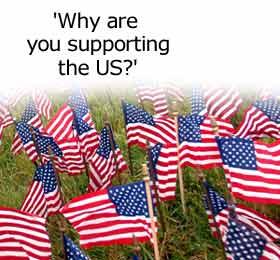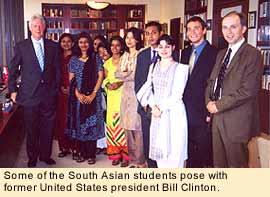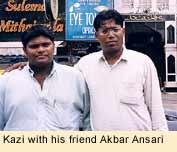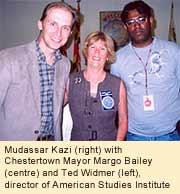Home > News > Specials
The Rediff Special/Syed Firdaus Ashraf
August 13, 2003

Mudassar Kazi sits in the students canteen at the Maharashtra College in the Muslim-dominated Nagpada area in south-central Mumbai and tries to explain to his classmates that the United States of America is not a demon as portrayed in some sections of the Indian Muslim community.
Counters Zaheeruddin Khan, "You are brainwashed after one visit to their country. The US attacks only Muslim countries. They never attack European countries. They are against Islam and our culture." 
Asks another classmate Mohammad Irfan, "Why are you teaching us the virtues of that country when the fact is that they are only interested in harming the Muslim cause? Be it in Palestine, Afghanistan or Iraq. Why did they invite you free of cost to their country? If they are calling you there that means they have done something wrong, isn't it?"
Says Mudassar, "I feel frustrated after coming from there (the US). I thought I could change so many things in the Muslim community. One week after my visit I am unable to change how my friends think. I have told them the Bush administration is wrong, but not the American people who have got nothing to do with US foreign policy. But no one is willing to understand. I am not pro-American, but my friends tell me I have sold out to the US cause."
Mudassar is not alone.
Like him, Akbar Ansari, another Muslim student who traveled to the US last month, is unable to convince his friends.
Twenty-one Muslims from India, Pakistan and Bangladesh traveled to America on a study trip to understand the US government and its people better. During the month-long programme, sponsored by the US State Department, 12 girls and nine boys travelled to New York, Washington, DC and Philadelphia.
The State Department conceived the programme after the 9/11 terrorist attacks to improve the understanding of America among young Muslims.
The 21 South Asians met American Muslim preachers, college students, city mayors and former president Bill Clinton among others.
 India was represented by seven Muslim students; three from Mumbai, two from Delhi, one each from Chennai and Hyderabad.
India was represented by seven Muslim students; three from Mumbai, two from Delhi, one each from Chennai and Hyderabad.
Says Akbar, "I have been anti-American all my life. After going there I realised common Americans are ignorant about Muslims and Islam. They have no idea what Islam stands for. They associate Islam only with jihad and terrorism. This visit has made me realise the American perspective and their lifestyle."
Asked how his perception about America has changed, he says, "I feel President Bush has wrong advisers and his policies are against Muslim countries. I realised that many Americans I met have never agreed with the Bush doctrine. It is just like in India. Many Hindus may agree with the BJP, but there are many more who do not agree with the BJP's policies."
Adds Mudassar, "We met many maulvis and Muslims and found they had complete freedom in US. They were not  harmed after 9/11 because the police gave them full protection. They had their rights protected under the US Constitution and were treated equally with other citizens on any issue."
harmed after 9/11 because the police gave them full protection. They had their rights protected under the US Constitution and were treated equally with other citizens on any issue."
Asked what it was like to interact with students from Bangladesh and Pakistan, Akbar says, "We discussed the Kashmir issue. We became great friends and chat on the Internet after our visit. They are just like us. I don't understand what the need to fight is when we can resolve all issues through talks. Even when we met Clinton he told us we are the future of South Asia and should resolve the Kashmir problem."
Have their Bangladeshi and Pakistani friends encountered an understanding gap as they did after their US visit? Says Akbar, "My friend Omar from Lahore faces the same problem as we face here. He said no one is willing to believe that the American people can be good to Muslims."